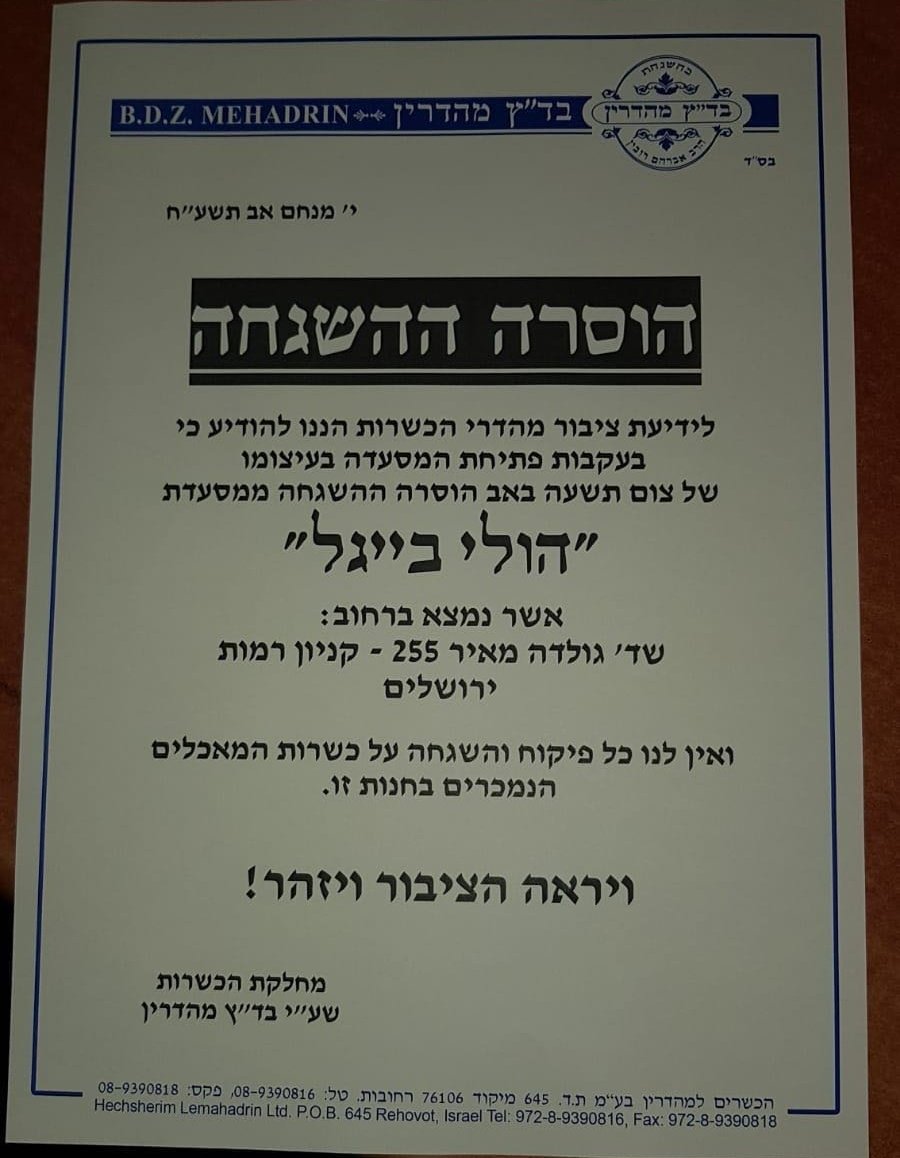It is somewhat culturally acceptable for food establishments to open in the afternoon, though not in the capacity of a sit-down restaurant. They can generally open up for the purpose of selling food for people to use to break the fast, and the like.
This afternoon the hechsher of Rabbi Rubin put out signs saying that their hechsher has been removed from Holy Bagel in the Ramot Mall and they are no longer responsible for the kashrut of the food there.
From the reports, it seems that after Holy Bagel opened, some people saw, and complained about, a woman, or two women, sitting and ordering food. Rabbi Rubin immediately pulled the hechsher. There is supposedly a video that went around showing this, though I have not seen it.
In response, the owner of the branch said that he opened for the purpose of preparing food for takeout for people to buy to break the fast. This one incident happened when he wasn't yet there and it was the wife of an employee who is pregnant and had some sort of medical urgency and desperately needed a drink so she sat down and had one. He is confident that he will get the hechsher back when it is all cleared up.
source: Kikar
I don't know what the rules are exactly, and it seems to be not so clear. Even though Tisha bAv was pushed off rather than on its official day, and therefore people can be more lenient about fasting if they have a need, it is still inappropriate for recreational activities such as sitting in a restaurant.
I have no idea if the hechsher in this instance investigated and discussed it with the owner to get the situation clear before making a decision or if they just pulled it right when they found out. On the one hand I wouldn't want people to take advantage and turn it into a recreational day using the excuse that they don't feel good. On the other hand, I would not want a restaurant to refuse to service someone who really does not feel good out of fear of losing the hechsher and instead prefer to let a pregnant woman suffer in the heat.
------------------------------------------------------
Reach thousands of readers with your ad by advertising on Life in Israel
Reach thousands of readers with your ad by advertising on Life in Israel
------------------------------------------------------


I don't know why they have to lose their hechser for that.
ReplyDeleteI guess it is as bad, or as inappropriate, as opening a restaurant on Shabbos...
ReplyDeleteI guess they feel it is better that people who do not fast for various reasons eat in tref restaurants.
ReplyDeletewhat's wrong with people? if a person has a legitimate reason for eating on a public fast day they need to do it in private. did they never hear of maarit ayin, vheyitem nkiyim, etc.? unless the women who felt she needed to drink on tisha bav was in danger of dying unless she drank that minuet, she should have taken her drink to a private place (even the bathroom if there was nowhere else) rather than drink in public. non the less, i imagine that the owner will get the hashgacha back once he demonstrates that he could not have foreseen such a foolish women, and will take precautions against a repeat of such foolishness in the future.
ReplyDeleteIn the case of a nedcha fast derabanin, someone who is allowed to eat cannot have a drink in public because maarit ayin.
DeleteA restaurant is allowed to be open and people are allowed to buy take out food from such a restaurant is not considered maarit ayin. I am having trouble understanding the difference between the two.
I think it isnt the kashrut. it is the atmosphere created by having people in a restaurant. Tisha bAv isnt supposed to be a day of happiness and going out to eat and the like
DeleteI have been asking for years why people consider various hashgachot to be 'good' and others to be 'unreliable'. I now know 2 things about Rav Rubin to earn their reputation for reliability in kashrut.
ReplyDelete